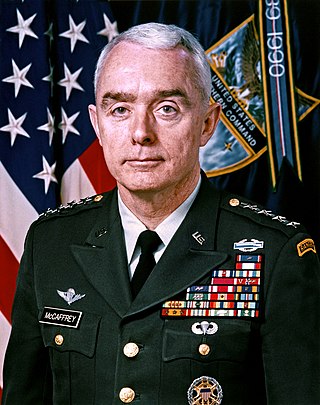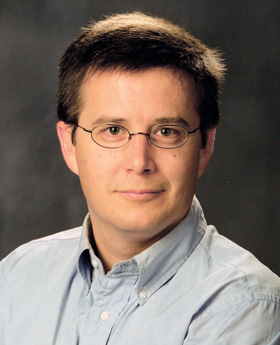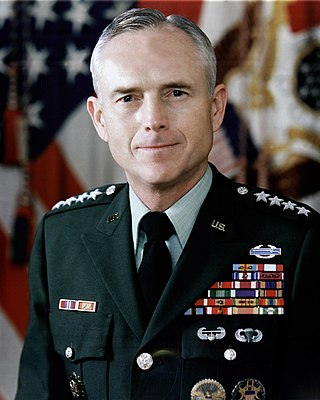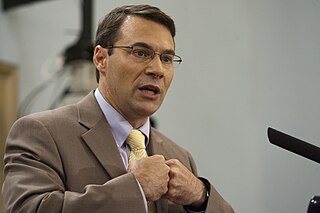
The Center for Strategic and International Studies (CSIS) is an American think tank based in Washington, D.C. From its founding in 1962 until 1987, it was an affiliate of Georgetown University, initially named the Center for Strategic and International Studies of Georgetown University. The center conducts policy studies and strategic analyses of political, economic and security issues throughout the world, with a focus on issues concerning international relations, trade, technology, finance, energy and geostrategy.
The United States Department of Defense's Office of Net Assessment (ONA) was created in 1973 by Richard Nixon to serve as the Pentagon's "internal think tank" that "looks 20 to 30 years into the military's future, often with the assistance of outside contractors, and produces reports on the results of its research". The Director of Net Assessment is the principal staff assistant and advisor to the Secretary and Deputy Secretary of Defense on net assessment.

Andrew W. Marshall was an American foreign policy strategist who served as director of the United States Department of Defense's Office of Net Assessment from 1973 to 2015. Appointed to the position by President Richard Nixon, Marshall remained in office during all successive administrations that followed until his retirement on January 2, 2015. He was succeeded in the role by James H. Baker.

Joseph Samuel Nye Jr. is an American political scientist. He and Robert Keohane co-founded the international relations theory of neoliberalism, which they developed in their 1977 book Power and Interdependence. Together with Keohane, he developed the concepts of asymmetrical and complex interdependence. They also explored transnational relations and world politics in an edited volume in the 1970s. More recently, he pioneered the theory of soft power. His notion of "smart power" became popular with the use of this phrase by members of the Clinton Administration and the Obama Administration.
Grand strategy or high strategy is a state's strategy of how means can be used to advance and achieve national interests in the long-term. Issues of grand strategy typically include the choice of military doctrine, force structure and alliances, as well as economic relations, diplomatic behavior, and methods to extract or mobilize resources.

Barry Richard McCaffrey is a retired United States Army general and current news commentator, professor and business consultant who served in President Bill Clinton's Cabinet as the Director of the Office of National Drug Control Policy. He received three Purple Heart medals for injuries sustained during his service in the Vietnam War, two Silver Stars, and two Distinguished Service Crosses—the second-highest United States Army award for valor. He was inducted into United States Army Ranger Hall of Fame at the United States Army Infantry Center at Fort Benning in 2007.

Peter Douglas Feaver is an American professor of political science and public policy at Duke University and a civil-military relations scholar.

John Adams Wickham Jr. is a retired United States Army general who served as the United States Army Chief of Staff from 1983 to 1987.

John Albert Nagl is a retired Lieutenant Colonel in the United States Army. He is a former president of the Center for a New American Security and former headmaster of The Haverford School. Nagl is an expert in counterinsurgency and has published two books on military strategy.

Arthur Edmon Brown Jr. is a retired four-star general of the United States Army who served as Vice Chief of Staff (VCSA) from 1987 to 1989.

Michael George Vickers is an American defense official who served as the Under Secretary of Defense for Intelligence (USD-I). As USD-I, Vickers, who was appointed by President Barack Obama in 2010, was the Defense Department's top civilian military intelligence official. Before becoming USD-I, Vickers served as Assistant Secretary of Defense for Special Operations and Low Intensity Conflict.
Raymond Francis DuBois Jr. is a private consultant in national security and defense policy and also a senior adviser at the Center for Strategic and International Studies, a nonpartisan think-tank in Washington, D.C. At CSIS he focuses on international security policy, civil-military relations, defense management reform, and Joint Professional Military Education. His expertise is in Defense Department organization, management and reform; land forces tactical and non-tactical systems; international and domestic installations and environmental issues; base realignment and closure; National Guard and Reserves issues; stability operations and reconstruction; continuity of business operations and crisis management. He was a member of the Defense Health Board and its NCR BRAC Health Systems Advisory Committee in 2006 to 2009. DuBois was a member of the Bipartisan Policy Center’s Commission on Stabilizing Fragile States. He is a member of the International Advisory Council of the United States Institute of Peace, a member of the Princeton University ROTC Board of Directors. He has spoken at the Maxwell School of Syracuse University, at the European Forum Alpbach 2008 in Austria, at the Marine Corps University, Quantico, Virginia, and before audiences of the National Defense Industry Association and the Association of the United States Army.

The RAND Corporation is a non-partisan American nonprofit global policy think tank, research institute, and public sector consulting firm that engages in research and development (R&D) across multiple fields and industries.
Lewis Stone "Bob" Sorley III is an American intelligence analyst and military historian. His books about the U.S. war in Vietnam, in which he served as an officer, have been highly influential in government circles.
The Center for Strategic and Budgetary Assessments (CSBA) is an independent, non-profit, Washington, D.C.-based think tank specializing in US defense policy, force planning, and budgets. It is headed by Thomas Mahnken. CSBA's stated mission is "to develop innovative, resource-informed defense concepts, promote public debate, and spur action to advance U.S. and allied interests."

Robert Orton Work is an American national security professional who served as the 32nd United States Deputy Secretary of Defense for both the Obama and Trump administrations from 2014 to 2017. Prior to that, Work was the United States Under Secretary of the Navy from 2009 to 2013, and before that served as a colonel in the United States Marine Corps; Work retired in 2001 and worked as a civilian at the Center for Strategic and Budgetary Assessments (CSBA) and the George Washington University in various positions relating to military and strategic study. From 2013 to 2014, he was the CEO of the Center for a New American Security (CNAS). After his time as Deputy Secretary of Defense, he went on to serve on the board of Raytheon. As of October 2023, he serves on the Special Competitive Studies Project's board of advisors.
AirSea Battle is an integrated battle doctrine that forms a key component of the military strategy of the United States. The doctrine became official in February 2010, and was renamed to Joint Concept for Access and Maneuver in the Global Commons (JAM-GC) in 2015.
Stephen D. Biddle is an American author, historian, policy analyst and columnist whose work concentrates on U.S. foreign policy. Currently, he is the Professor of International and Public Affairs at School of International and Public Affairs, Columbia University. He received recognition for his 2004 book Military Power: Explaining Victory and Defeat in Modern Battle, published through Princeton University Press. He also has worked in groups under Generals Stanley McChrystal and David Petraeus forming U.S. counter-insurgency policy.

Anti-Access/Area Denial is a military strategy to control access to and within an operating environment. In an early definition, anti-access refers to those actions and capabilities, usually long-range, designed to prevent an opposing force from entering an operational area. Area denial refers to those actions and capabilities, usually of shorter range, designed to limit an opposing force's freedom of action within the operational area. In short, A2 affects movement to a theater, while AD affects movement within a theater. A2/AD typically refers to a strategy used by a weaker opponent to defend against an opponent of superior skill, although a stronger opponent can also use A2/AD.

Richard H. Shultz, Jr. is an American scholar of international security studies. He is a Professor International Politics at The Fletcher School of Law and Diplomacy, Tufts University, where he is also the director of the International Security Studies Program (ISSP).













